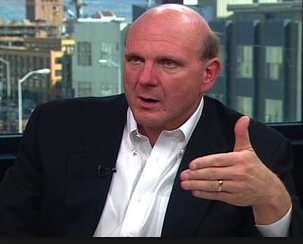Microsoft's new mission statement: No more computer on every desk

Microsoft used to have a succinct mission statement: Put "a computer on every desk and in every home."

Its new one is more of a mouthful. Outgoing CEO Steve Ballmer called it out in his final shareholder letter, which is part of Microsoft's Annual Report for 2013, which the company published on its investor site on October 7. Ballmer used last year's letter to shareholders to communicate the idea that Microsoft planned to morph from a software company to a devices and services company.
Microsoft's new corporate mission for 2013 and beyond is "to create a family of devices and services for individuals and businesses that empower people around the globe at home, at work and on the go, for the activities they value most."
I'd humbly suggest a slightly shorter version: "Create a family of devices and services for individuals and businesses."
But I understand why Ballmer and other Softies keep dwelling on the "activities they value most" part of the new equation. This is shorthand for Microsoft management's belief that the consumerization of IT is real and here to stay. Mail is neither a consumer nor a business app; it's both. Ditto with instant messaging/video chat, notetaking and basic document creation, Microsoft execs maintain. This belief is key to why Microsoft execs insist they need to be in both the consumer and enterprise business and both the device and services business.
Microsoft management's contention is Microsoft needs to be a provider of technology from consumer device to enterprise service and control the entire end-to-end stack and experience. If Microsoft doesn't do this, the top brass claims, there's a risk that one of the other leaders may box the company out, by refusing to support Microsoft's hardware, software and services — something that Google already has done in some cases.
Microsoft wants to be more like Apple on the consumer and devices front, and more like Google and Amazon on the services front. Those are two different business models. I, myself, am not sure that a single company — even a "One Microsoft" — can serve both masters.
But at least for now, Microsoft is moving full steam ahead with its plans to be all things to all users. The coming fiscal year should be an interesting one. It will be interesting to go back and compare Microsoft's new goal with what Microsoft, with a new CEO, a new phone-manufacturing arm, and an evolving tablet/device business look like in fall 2014.
Any suggestions for the 'Soft for a pithier, shorter mission statement for the year ahead?